Campus
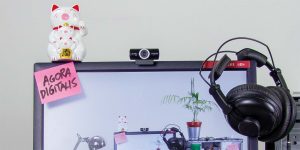
Gallery Performances I
Alejandro Quiñones Roa, Razieh Kooshki & Vahid Qaderi, Afra Sönmez & Nursinem Aslan
Cascada, Vivid Q, Onisma - Livestream
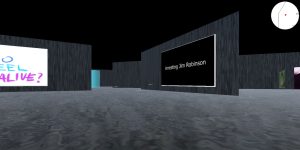
Virtual students’ exhibition “Hopes & Slopes”
VDA PhAMA (Department of Photography and Media Art at Vilnius Academy of Arts)
Made during the most intensive quarantine period works by artists from the youngest generation rethink isolation, solitude, remoteness, trauma and translate them into visual and aural vibes. All these artists are studying Animation or Photography and Media Art (PhAMA) at Vilnius Academy of Arts. - An exhibition by a group of young artists titled Hopes & Slopes is a place for a safe walk among what has fallen out a few months back.
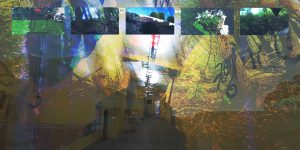
Multi-eyed creature navigating and traversing the grove
PhAMA/ FAMM department at Vilnius Academy of Arts (LT)
AE Garden Vilnius Mozilla Hub hosts directed multiangle and XR Live Experience of the Garden where around 10 live events and usual grove life are happening in numerous spaces inside and outside and dozen cameras are directed by humans, animals and plants. You can navigate through busy culture events or find your calm spot to enjoy the life of nature.
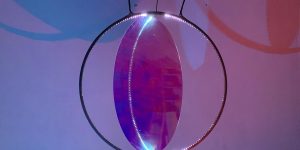
Dialogue#4 – shifting perspectives
HKU University Of The Arts Utrecht (NL)
In Dialogue#4 we talk about shifting perspectives. With several artists involved in the exhibition we discuss the aspect of “reality” and in what way art should contribute to a broader perspective on reality. Things we take for granted are maybe not what they seem, or at least there is another way of looking at them. When looking at it this way then there is no fake news as it is just another perception of reality. In a world fixed on maintaining certainty, and thus one perspective as the truth, how can artists fight against this narrow minded view on reality?

Dialogue#3 – demystifying technology
HKU University Of The Arts Utrecht (NL)
Dialogue#3 is about demystifying technology. Technology is often a black box. We have no clue what is inside the equipment we use every day. In some cases, there is even no way to open the tools we use so frequently. In what ways can we hack the technology we encounter and use every day and all day and can we give a new or different use and meaning to it? What do we learn from this process and about the way things are made and maybe should be made?

Dialogue#2 – imagining tomorrow
HKU University Of The Arts Utrecht (NL)
Dialogue#2 is called imagining tomorrow. Nobody can deny our world is in a huge transition. We live in an age of uncertainty where we are forced to rethink basically every aspect of our society from the personal to the governmental to the spiritual. We discuss with artists how they look at the responsibility of creatives when it comes to changing the world. And, is it just about exposing the problems we face or can you do more as an artist?

Dialogue#1 – data driven art
HKU University Of The Arts Utrecht (NL)
The dialogues are moderated sessions to have a more in depth look at and discussion on the underlying themes of the works at the exhibition. Dialogue#1 is about data driven art. With artists involved in the exhibition we discuss the need to make the invisible world behind technology in our society visible.
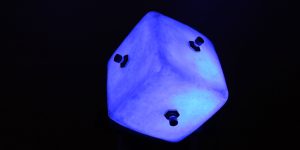
Online Exhibition NEW CONNECTIONS
HKU University Of The Arts Utrecht (NL)
The opening night will feature several live performances all related to the theme “new connections”. This for example by revisiting and passing on music traditions through electronic means, new tactile electronic instruments and an AV show performed by live coding artists.
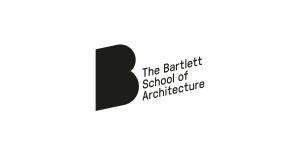
Bartlett artists’ videos
The Bartlett School of Architecture, University College London (UK)
A 1-hour collection of student project films from the Bartlett School of Architecture’s Interactive Architecture Lab, Automated Architecture Ltd/Automated Architecture Labs, BioID, Unit 24, Unit 9, Unit 14, RC14.

Alexander Whitley Dance Company
The Bartlett School of Architecture, University College London (UK)
Initiated in response to the Covid-19 lockdown, Digital Body uses motion capture technology to digitise sequences of choreography and makes them freely available online. CHAOTIC BODY brings together three composers and digital artists to collaborate with AWDC company on the creation of three short films and AR projects taking inspiration from chaos theory and the associated geometric patterns in nature.
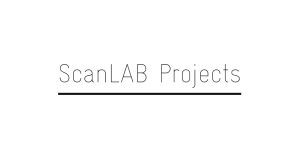
ScanLAB Projects HUB
The Bartlett School of Architecture, University College London (UK)
Unit 9 is a design studio within the undergraduate architecture programme at the Bartlett UCL. Led by Jessica In and Chee-Kit Lai, the Unit has developed a continued interest in the performative aspects of new technologies and their expressive potentials for the design and representation of architecture.
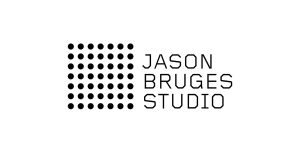
Jason Bruges Studio (UK)
The Bartlett School of Architecture, University College London (UK)
A curated selection of talks and 360 films that provide insight into the Studio’s process and practice. Normally inhabiting physical spaces, a number of the Studio’s installations are transformed and brought to a virtual audience for the first time.
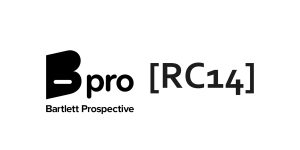
Urbanism Beyond Cognition
The Bartlett School of Architecture, University College London (UK)
Developed by Research Cluster 14, the projects showcase how data allows designers to expand their remit by design at the scale of a country or how AI can give agency to non-human ecological and robotic actors.

PG24
The Bartlett School of Architecture, University College London (UK)
PG24 is a group of architectural storytellers employing design, film, animation, drawing, virtual and augmented reality and physical modelling to rethink architecture’s relationship with time. We find inspiration in the dialogue between film and architecture, study their intertwined histories and seek the magical possibilities arising from their fusion.

BSc Unit 9 HUB
The Bartlett School of Architecture, University College London (UK)
Unit 9 is a design studio within the undergraduate architecture programme at the Bartlett UCL. Led by Jessica In and Chee-Kit Lai, the Unit has developed a continued interest in the performative aspects of new technologies and their expressive potentials for the design and representation of architecture.
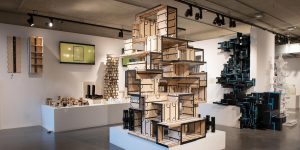
Automated Architecture Labs HUB
The Bartlett School of Architecture, University College London (UK)
AUAR Labs is the research laboratory co-directed by Mollie Claypool, Manuel Jimenez Garcia and Gilles Retsin at The Bartlett School of Architecture, previously known as Design Computation Lab. As part of AUAR Labs co-directors run the studio Research Cluster 4 (RC4) in MArch Architectural Design at The Bartlett focused on automated housing. The work of RC4 believes in the agency of architecture for change. Automation is not only about robots – it is first and foremost a design project.
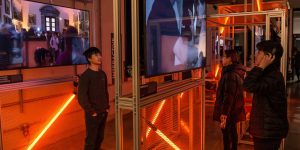
Design for Performance and Interaction / Interactive Architecture Lab HUB
The Bartlett School of Architecture, University College London (UK)
IAL Hub Space showcases student projects. The space takes a critical stance on developments across art, science, and technology to spearhead thinking in the 21st century. The projects presented are films and virtual prototypes. We have come to realize that now, more than ever, boundaries which define the arts and sciences no longer hold. To address the changing political, ecological, and technological landscapes, we engage in dialogues that are unfamiliar or uncomfortable.
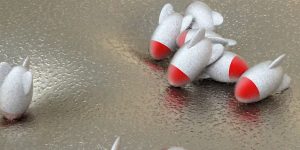
[Dis]possess
Jason Zhao, et al.
[Dis]possess highlights the contradictory forces of capital and progressive politics within the artworld, simulating a coworking space in downtown Chicago that sells twenty-first century indulgences for the price of a cup of coffee.
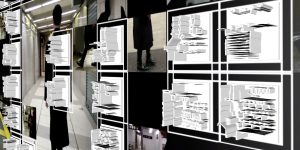
[Dis]location
Brett Balogh; William Harper; James Hartunian; Kristin McWharter; Patrick O’Shea; Jung Ho Park; Zhong Ren
[Dis]location investigates and extends specific sites in Chicago and beyond to foreground our shared connections to public spaces in both the built and natural environments.
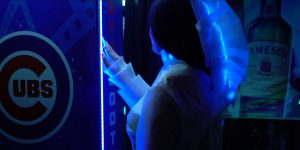
[Dis]place
Lola Blake; Jiwon Ham; Addison Tyler Leon; Ethan Proia; Meimei Song; Yimin Zheng
[Dis]place questions the reciprocal relationship between the self and its surroundings in an attempt to expand fixed notions of subject, host, and home.


